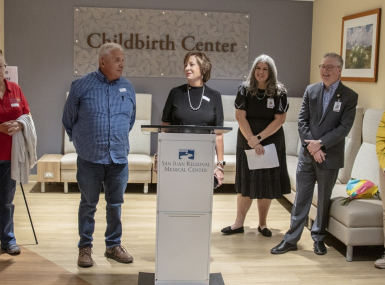Now I know to close the public disconnect

Key Takeaways
As told by Geneva County, Ala. Commissioner Weston Spivey
When you’re running for office, you hear about what is aggravating people, whether it’s the service they get at the courthouse, the condition of the roads or their solid waste pickup. You hear some real horror stories, and you’ll want to make sure you take care of those problems as soon as you can.
Then you get elected and think you want to start making changes, but you have to hold back on pushing for any major changes for about six months. You need to take six months and evaluate the people that are there and the responses that you’re given when you address an issue with them. That’s the advice we received from Sonny Brasfield, executive director of the Association of County Commissions of Alabama.
With a lot of those horror stories, it’s like in kindergarten, when you’d play the telephone game. One person repeats a message to another person, and then another, and by the time you get to the end, the message is nothing like it was originally. That’s because it’s really hard for county department heads to communicate peer-to-peer with citizens. And a lot of times, it’s probably not their job to deal with people one-on-one.
My biggest leadership learning curve has been becoming an information delivery source for citizens. A lot of times, they don’t understand how things work inside the courthouse… there are policies and budget considerations. You have to operate between both of those levels when you’re a commissioner making decisions but also engaging with the public — you’re an insider and an outsider.
A lot of times, the people in these positions are very smart and very talented and they might get a bad rap because our citizens get disgruntled about things. If you can help citizens see all sides of an issue, like when a road is going to be paved or what plans the county has in place to resolve solid waste challenges, they’ll understand.
You can pretty easily find the super citizens who are involved in the day-to-day issues. They know how the courthouse works and they can help you understand what some of the public’s problems are and they can take some of the emotion and frustration out of what you might hear from a lot of people. They’re the “micro-influencers” and the stakeholders.
I’m 24, but I’ve also made sure to learn from everyone in the community. I know I have a lot to learn from someone who is 74 and has a lot more experience doing these things than I do. I know that even though we’re dealing with new problems every day, someone’s seen something like this before, somewhere.
Related News

Now I know I can adapt my communication style
San Juan County, N.M. Commissioner Terri Fortner spent her career working with people one-on-one, but she overcame hangups about online communication when the pandemic forced her onto video calls when she first took office.

County service meets a veteran’s need for purpose in Spotsylvania County, Virginia
After Drew Mullins transitioned from a high-performance lifestyle in the military, he found the environment and purpose he sought when he took office in his county.
Now I know that solid waste is complicated
Custer County, Idaho Commissioner Will Naillon says solid waste removal is "one of the things that people often take for granted until it’s their job to make sure it happens... that’s the story of being a county commissioner."
County News
Now I know to proactively reach out
If Frederick County, Md. Councilmember M.C. Keegan-Ayer is going to be an effective leader, she must constantly reach out regardless of what's going on.
